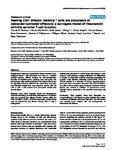Resting CD4+ effector memory T cells are precursors of bystander-activated effectors: a surrogate model of rheumatoid arthritis synovial T-cell function
| dc.contributor.author | Brennan, FM | |
| dc.contributor.author | Smith, NMG | |
| dc.contributor.author | Owen, S | |
| dc.contributor.author | Li, C | |
| dc.contributor.author | Amjadi, P | |
| dc.contributor.author | Green, P | |
| dc.contributor.author | Andersson, A | |
| dc.contributor.author | Palfreeman, AC | |
| dc.contributor.author | Hillyer, P | |
| dc.contributor.author | Foey, Andrew | |
| dc.contributor.author | Beech, JT | |
| dc.contributor.author | Feldmann, M | |
| dc.date.accessioned | 2019-07-10T12:39:19Z | |
| dc.date.available | 2019-07-10T12:39:19Z | |
| dc.date.issued | 2008 | |
| dc.identifier.issn | 1478-6354 | |
| dc.identifier.issn | 1478-6362 | |
| dc.identifier.other | ARTN R36 | |
| dc.identifier.uri | http://hdl.handle.net/10026.1/14621 | |
| dc.description.abstract |
BACKGROUND: Previously we described a system whereby human peripheral blood T cells stimulated for 8 days in a cytokine cocktail acquired effector function for contact-dependent induction of proinflammatory cytokines from monocytes. We termed these cells cytokine-activated (Tck) cells and found that the signalling pathways elicited in the responding monocytes were identical whether they were placed in contact with Tck cells or with T cells isolated from rheumatoid arthritis (RA) synovial tissue. METHODS: Here, using magnetic beads and fluorescence-activated cell sorting, we extensively phenotype the Tck effector cells and conclude that effector function resides within the CD4+CD45RO+, CCR7-, CD49dhigh population, and that these cells are derived from the effector memory CD4+ T cells in resting blood. RESULTS: After stimulation in culture, these cells produce a wide range of T-cell cytokines, undergo proliferation and differentiate to acquire an extensively activated phenotype resembling RA synovial T cells. Blocking antibodies against CD69, CD18, or CD49d resulted in a reduction of tumour necrosis factor-alpha production from monocytes stimulated with CD4+CD45RO+ Tck cells in the co-culture assay. Moreover, blockade of these ligands also resulted in inhibition of spontaneous tumour necrosis factor-alpha production in RA synovial mononuclear cell cultures. CONCLUSION: Taken together, these data strengthen our understanding of T-cell effector function, highlight the multiple involvement of different cell surface ligands in cell-cell contact and, provide novel insights into the pathogenesis of inflammatory RA disease. | |
| dc.format.extent | R36-R36 | |
| dc.format.medium | Print-Electronic | |
| dc.language | en | |
| dc.language.iso | eng | |
| dc.publisher | Springer Science and Business Media LLC | |
| dc.subject | Antigens, CD | |
| dc.subject | Arthritis, Rheumatoid | |
| dc.subject | CD4-Positive T-Lymphocytes | |
| dc.subject | Cell Lineage | |
| dc.subject | Cells, Cultured | |
| dc.subject | Cytokines | |
| dc.subject | Flow Cytometry | |
| dc.subject | Humans | |
| dc.subject | Immunologic Memory | |
| dc.subject | Lymphocyte Activation | |
| dc.subject | Monocytes | |
| dc.subject | Phenotype | |
| dc.subject | Synovial Membrane | |
| dc.subject | T-Lymphocyte Subsets | |
| dc.title | Resting CD4+ effector memory T cells are precursors of bystander-activated effectors: a surrogate model of rheumatoid arthritis synovial T-cell function | |
| dc.type | journal-article | |
| dc.type | Journal Article | |
| dc.type | Research Support, Non-U.S. Gov't | |
| plymouth.author-url | https://www.webofscience.com/api/gateway?GWVersion=2&SrcApp=PARTNER_APP&SrcAuth=LinksAMR&KeyUT=WOS:000257144900015&DestLinkType=FullRecord&DestApp=ALL_WOS&UsrCustomerID=11bb513d99f797142bcfeffcc58ea008 | |
| plymouth.issue | 2 | |
| plymouth.volume | 10 | |
| plymouth.publication-status | Published | |
| plymouth.journal | Arthritis Research & Therapy | |
| dc.identifier.doi | 10.1186/ar2390 | |
| plymouth.organisational-group | /Plymouth | |
| plymouth.organisational-group | /Plymouth/Faculty of Health | |
| plymouth.organisational-group | /Plymouth/Faculty of Health/School of Biomedical Sciences | |
| plymouth.organisational-group | /Plymouth/REF 2021 Researchers by UoA | |
| plymouth.organisational-group | /Plymouth/REF 2021 Researchers by UoA/UoA01 Clinical Medicine | |
| plymouth.organisational-group | /Plymouth/REF 2021 Researchers by UoA/UoA01 Clinical Medicine/UoA01 Clinical Medicine | |
| plymouth.organisational-group | /Plymouth/Research Groups | |
| plymouth.organisational-group | /Plymouth/Research Groups/Institute of Translational and Stratified Medicine (ITSMED) | |
| plymouth.organisational-group | /Plymouth/Research Groups/Institute of Translational and Stratified Medicine (ITSMED)/CBR | |
| plymouth.organisational-group | /Plymouth/Users by role | |
| plymouth.organisational-group | /Plymouth/Users by role/Academics | |
| dc.publisher.place | England | |
| dcterms.dateAccepted | 2008-03-19 | |
| dc.identifier.eissn | 1478-6362 | |
| dc.rights.embargoperiod | Not known | |
| rioxxterms.versionofrecord | 10.1186/ar2390 | |
| rioxxterms.licenseref.uri | http://www.rioxx.net/licenses/all-rights-reserved | |
| rioxxterms.licenseref.startdate | 2008 | |
| rioxxterms.type | Journal Article/Review |


